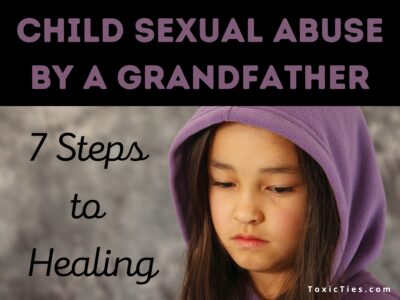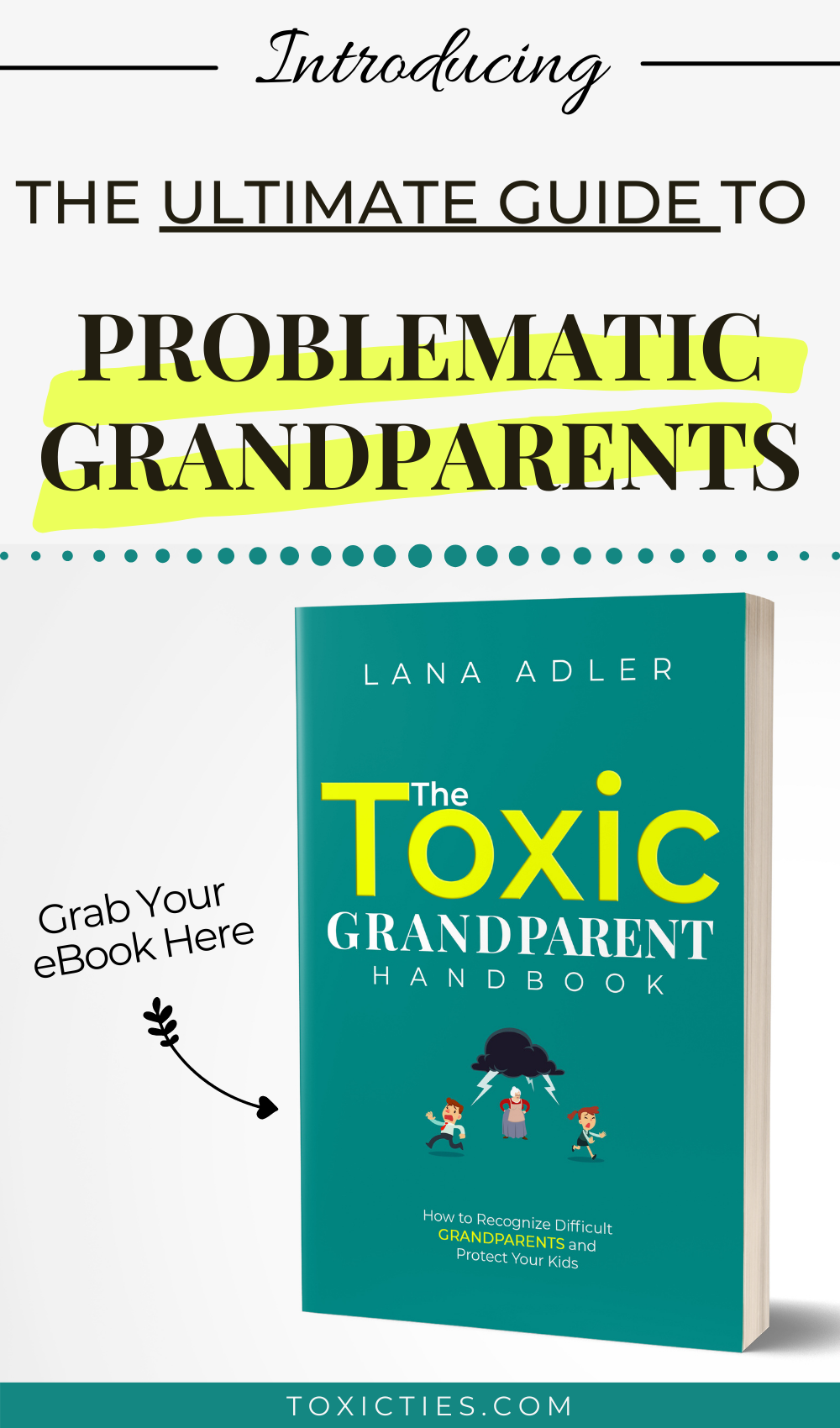Having a toxic mother-in-law can be an immense challenge, but when she also becomes a grandmother, the emotional toll can be devastating.
When a toxic grandmother is involved, it doesn’t just affect you or your husband. The effects ripple out and impact the entire family, especially the children.
They may witness emotional abuse, feel pressured to choose sides, or be the target of a grandmother’s cruel behavior. This can leave psychological scars and teach them unhealthy relationship patterns.
If you’re dealing with a toxic mother-in-law as a grandmother, please know that you’re not alone. Her behavior is a reflection of her own issues, not a commentary on your worth as a parent.
This blog post will help you navigate a relationship with a toxic mother-in-law as a grandmother and protect your kids from possible abuse.
What is a Toxic Mother-in-Law?
We’ve all heard horror stories about toxic mothers-in-law — the ones who can’t seem to let their child’s partner breathe without making a critical comment. But what exactly defines a “toxic” mother-in-law, and how can you cope if you find yourself dealing with one?
The National Cancer Institute defines toxicity as “the extent to which something is poisonous or harmful.” Similarly, a person can be considered toxic when they consistently affect the people around them in a negative way.
A toxic mother-in-law is someone who undermines, belittles, or tries to control their child’s partner. They may make snide remarks about your parenting, appearance, or life choices. Or they might try to manipulate situations to “one-up” you and make you feel inadequate.
Having a mother-in-law like this can be painful, frustrating, and draining. It can chip away at your self-esteem and make you feel like you’re never good enough.
Ultimately, a toxic MIL will never accept you as an equal partner to her child. But as bad as it is, that pales compared to the damage she can do as a grandmother.
10 Harmful Effects of a Toxic Mother-in-Law on Grandchildren
From undermining your parenting to sowing seeds of doubt and insecurity, here are 10 ways a toxic mother-in-law can harm her grandchildren.
1. Pitting your kids against each other.
A toxic mother-in-law can praise one child (“the golden grandchild”) while cutting the other down, making your kids feel like they have to compete for her love and approval.
These divide-and-conquer tactics breed sibling rivalry and family discord. Before you know it, the once-close siblings are at each other’s throats.
2. “Buying” their affection.
A toxic MIL can shower her grandchildren with gifts and attention to “groom” them, then withhold it as punishment.
This emotional manipulation can be devastating for impressionable young minds. It can lead to feelings of guilt, obligation, and resentment in your children.
3. Badmouthing you.
A vindictive MIL may gossip about you to your kids, painting you as the “bad guy” to win their loyalty.
This can erode your child’s trust and respect for you, damaging one of the most important bonds in their life.
4. Interfering with your rules.
A toxic grandmother may intentionally interfere with or disregard bedtimes, schedules, routines, and other rules you have for your children.
This disrupts the stability and structure your kids need to thrive.
5. Criticizing your parenting choices.
Narcissistic or controlling mothers-in-law often see their grandchildren as extensions of themselves, which is why they may try to dictate how you raise your kids, offering “helpful” advice that really comes from a place of one-upmanship.
This can leave you feeling judged and unsure of your abilities as a parent. And you won’t be the only affected party. Hearing a grandmother constantly putting you down can upset your children and even chip away at their self-esteem.
6. Being verbally abusive.
Toxic personalities thrive on tearing people down to elevate themselves, which is why they can be verbally abusive.
Verbal abuse comes in many forms. It can be as obvious as yelling, name-calling, or insults. But it can also be more subtle, almost undetectable.
Even subtle verbal abuse is detrimental to a child’s well-being.
A toxic mother-in-law might not think teasing or jokes are abuse, but they are, and they can erode your child’s self-esteem.
7. Comparing grandchildren to others.
A toxic mother-in-law may undermine your children’s confidence by constantly comparing them to others.
She may casually mention how little Timmy down the street is already reading at a 3rd-grade level or how her friend’s grandbaby just had her first piano recital.
The subtext is clear — your child isn’t good enough. This kind of comparison can leave a child feeling inadequate, ashamed, and like they’re not able to measure up.
It’s important to remember that this isn’t about your child — it’s a reflection of your mother-in-law’s own insecurities and need for control.
8. Overindulging your kids.
It’s natural for grandmothers to spoil their grandkids a little. But if your mother-in-law has a habit of indulging your kids with treats and activities you’ve prohibited, this is a red flag.
The reality is, a grandmother’s sizeable influence and a child’s natural desire to please can create a toxic triangle.
Your little ones may start to favor grandma’s permissive rules and doting attention over your more balanced, boundary-setting approach. This can lead to behavioral issues, confusion about authority figures, and even a rift in your relationship.
9. Emotional blackmail.
Emotional blackmail is a manipulative tactic meant to use your emotions against you. For example, a toxic parent may threaten to withhold love, affection, or access if you don’t comply with their wishes.
A toxic grandmother operates the same way. First, she showers her grandchildren with attention. Then she takes it away at the first sign of non-compliance.
That can leave grandkids feeling like they must constantly earn their grandmother’s affection or walk on eggshells to avoid her criticism.
This emotional blackmail is deeply traumatic. Your children deserve to feel unconditionally loved, accepted, and validated — not used as pawns in a toxic power struggle.
10. Punishing individuality
When the grandchildren are small, the grandmother may seem like the best grandma ever: attentive, generous, and caring.
But as they grow up and assert their individuality, the grandmother becomes more distant and punishing.
Depending on how much the grandchildren deviate from her idea of what they should be and her particular brand of toxicity, she will lash out either covertly or overtly.

When Grandma’s “Help” Does More Harm Than Good: Protecting Your Kids from a Toxic Mother-in-Law
Dealing with a toxic mother-in-law isn’t easy, especially when her actions affect your children. But protecting your family’s well-being is worth the effort. Here are some practical steps to help you navigate this tricky situation.
1. Set Firm Boundaries
Boundaries are essential when dealing with toxic behavior. This doesn’t mean shutting her out entirely but clearly defining what’s acceptable and what’s not. For example:
- If she criticizes your parenting in front of your kids, let her know privately and calmly that those discussions are off-limits around them.
- If she undermines your rules (like giving treats you’ve forbidden), explain why those rules exist and ask her to respect them.
Be consistent. If boundaries aren’t respected, follow through with consequences, like reduced visits or supervised interactions.
2. Limit Alone Time
If your mother-in-law uses emotional manipulation or badmouths you to your children, limit unsupervised visits. This doesn’t mean cutting off the relationship but protecting your child from harmful influences.
- Suggest more family-oriented gatherings where you and your partner are present.
- If solo visits are unavoidable, keep them short and check in with your kids afterward to understand what was discussed.
Keeping communication open helps you address any negative messaging before it takes root.
3. Communicate Clearly and Directly
When a toxic mother-in-law-turned-grandmother crosses the line, address the issue directly but respectfully. Use “I” statements to avoid sounding accusatory, which can escalate conflict. For example:
- “I feel hurt when negative comments about my parenting are made in front of the kids. I’d appreciate it if we could discuss any concerns privately.”
- “We’ve noticed that when the kids receive extravagant gifts, it creates confusion about our values. Could we agree on smaller, more meaningful presents?”
Keeping the conversation calm and respectful sets the tone for healthier interactions.
4. Teach Your Kids Critical Thinking
You can’t always control what your children hear, but you can teach them to think critically and trust their own experiences. Encourage open communication by:
- Asking open-ended questions like, “How did that make you feel?” or “What do you think about that?”
- Validating their feelings without immediately jumping to conclusions or criticizing their grandmother.
This approach helps your children process confusing experiences while maintaining emotional security.
5. Model Healthy Conflict Resolution
Children learn by example. Demonstrate healthy boundaries and respectful conflict resolution by:
- Speaking calmly and assertively, even when addressing difficult topics.
- Showing respect, even if you disagree. This teaches your children to handle conflict with dignity and self-respect.
By modeling emotional intelligence, you’re equipping your kids with valuable life skills.
6. Lean on Your Partner for Support
Navigating a toxic grandmother situation is easier when you and your partner are a united front. Have honest, non-judgmental conversations about:
- which boundaries are necessary to protect your kids, and
- how to communicate these boundaries as a team.
This solidarity not only reduces conflict but also strengthens your parenting partnership.

7. Seek Professional Help If Needed
If your mother-in-law’s behavior is deeply ingrained or particularly damaging, consider seeking outside help. Family therapy or counseling can provide:
- Strategies for managing conflict and setting boundaries.
- Emotional support for you, your partner, and your children.
There’s no shame in seeking help to protect your family’s well-being.
Final Thoughts
Dealing with a toxic mother-in-law as a grandmother is challenging, but you have to remember that your primary responsibility is to protect your kids. That means setting firm boundaries, refusing to engage with her dramatic behavior, and ensuring your children understand that your parenting decisions come first — no exceptions.
It won’t be easy, and Grandma may try to play the victim or guilt-trip you. Stay strong. Your kids need you to be their safe harbor in the storm. With patience, compassion, and a commitment to your family’s well-being, you can navigate this tricky terrain and help your little ones grow into confident, well-adjusted people despite their grandmother’s unhealthy behaviors.








Leave a Reply